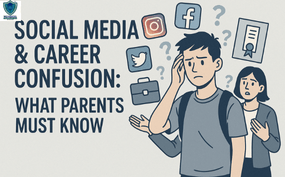Blog Details

30Jan
Exploring paths for children with artistic or unconventional talents
Every child is unique, and for those with artistic or unconventional talents, traditional career paths may not always align with their passions and skills. These children often possess a creative spark or a nontraditional way of thinking that can lead to fulfilling and innovative careers, provided they are guided and supported in the right way. Exploring diverse paths early not only helps them harness their talents but also equips them to thrive in a rapidly evolving job market that increasingly values creativity and individuality. This article delves into how parents and educators can identify, nurture, and guide children with artistic or unconventional talents toward meaningful and successful career opportunities.
Recognizing and Nurturing Artistic Talents
The first step is identifying and fostering the child’s artistic or unconventional skills.
- Encourage Exploration: Expose your child to various forms of art and creativity, such as painting, photography, music, writing, acting, or even coding for digital design. Let them experiment with different activities to discover their true passion.
- Provide Resources: Invest in tools, materials, and resources like art supplies, musical instruments, or software that can help them develop their craft.
- Enrol in Classes: Find specialized classes, workshops, or online courses where they can learn from experts and gain mentorship in their area of interest.
Introducing Career Possibilities for Artistic Talents
Help children understand that their artistic or unconventional skills can lead to exciting career opportunities. Some potential paths include:
- Visual Arts: Careers in illustration, graphic design, animation, game design, or fine arts.
- Performing Arts: Opportunities in acting, dancing, music composition, or theatre production.
- Writing and Storytelling: Creative writing, screenwriting, journalism, or content creation for blogs and digital platforms.
- Digital Arts and Technology: Career options like web design, user experience (UX) design, digital marketing, or virtual reality (VR) content creation.
- Fashion and Design: Careers in fashion design, textile design, interior design, or product design.
- Entrepreneurship: Starting a business in crafting, photography, handmade goods, or creative services.
- Multidisciplinary Roles: Careers that combine art with other fields, such as art therapy, museum curation, or creative direction in advertising.
Encouraging Non-Traditional Career Paths
Unconventional talents often thrive in unique and flexible career paths.
- Freelancing and Gig Work: Platforms like Fiverr, Behance, or Upwork provide opportunities to showcase artistic work and connect with clients worldwide.
- Entrepreneurship: Help them explore starting a small business or selling their creations online through platforms like Etsy, Shopify, or Instagram.
- Social media and Content Creation: Many artists today build successful careers as influencers, vloggers, or online educators on platforms like YouTube, TikTok, or Instagram.
- Public Exhibitions: Encourage them to showcase their work through art galleries, local exhibitions, or festivals.
Building Skills Beyond the Craft
In addition to honing their artistic abilities, children should develop complementary skills to succeed in unconventional careers.
- Business Skills: Teach them how to price their work, market themselves, and handle contracts or negotiations.
- Networking: Encourage them to connect with like-minded individuals or mentors who can guide their journey.
- Technology Skills: Many creative industries rely heavily on technology, so learning software like Adobe Creative Suite, video editing tools, or coding can be beneficial.
- Resilience and Adaptability: Teach them how to handle criticism, rejection, and industry changes while staying committed to their passion.
Supporting Emotional and Financial Growth
Artistic and unconventional paths can have unique challenges, such as irregular income or criticism. Preparing children for these realities is vital.
- Encourage a Growth Mindset: Help them see setbacks as opportunities to learn and grow. Teach them resilience to navigate the ups and downs of creative industries.
- Teach Financial Literacy: Show them how to manage income, save for lean periods, and diversify their revenue streams to maintain financial stability.
- Balance Passion and Practicality: While encouraging them to follow their passions, discuss practical considerations like potential income, job demand, and ways to supplement their earnings when starting out.
Leveraging Education and Mentorship
Education and mentorship play a key role in guiding artistic talents.
- Alternative Learning Options: Consider schools or programs that focus on the arts, such as performing arts academies, online creative courses, or specialty schools.
- Internships and Apprenticeships: Help them find internships, apprenticeships, or volunteer opportunities in their desired field to gain hands-on experience.
- Professional Mentors: Connect your child with professionals in their chosen field to learn from their experiences and receive personalized advice.
Celebrating Progress and Success
Creative careers often involve incremental growth, so celebrating achievements—no matter how small—keeps children motivated.
- Showcase Their Work: Display their art at home, share their accomplishments on social media, or help them organize small exhibitions.
- Encourage Feedback: Teach them to seek and accept constructive feedback from peers, teachers, and professionals.
- Recognize Milestones: Acknowledge their progress, whether it’s completing a course, landing a client, or finishing a project.
Conclusion
Children with artistic or unconventional talents have the potential to achieve great success when given the freedom to explore their creativity and the support to pursue nontraditional career paths. By encouraging their passions, providing resources and guidance, and teaching them practical skills, parents and mentors can help them turn their unique abilities into rewarding careers. The key lies in fostering a growth mindset, offering exposure to diverse opportunities, and helping them navigate challenges with resilience. In today’s world, creativity is not just an asset—it’s a superpower. Supporting these children ensures they have the tools to shine in their own extraordinary ways.
FAQ’s
How can I identify my child’s artistic or unconventional talents?
Observe what activities excite and engage your child the most. Look for signs such as creative problem-solving, artistic expression (drawing, painting, music, writing, etc.), or unique ways of thinking. Encourage them to explore different hobbies, and pay attention to areas where they show natural curiosity, skill, or passion.
How do I support my child’s creative passions without pressuring them?
Support your child by providing them with opportunities to explore their passions freely. Encourage experimentation and avoid setting rigid expectations. Let them try different activities to see what resonates most with them, and focus on celebrating their progress rather than results. Provide resources like classes, workshops, and mentorship to nurture their talents.
Are unconventional talents practical for a stable career?
Yes, unconventional talents can lead to fulfilling and financially stable careers, especially in today’s world where creativity and innovation are highly valued. However, success in these fields often requires strategic planning, skill development, and the ability to adapt to market trends. Teaching your child resilience, financial literacy, and business skills will help them turn their passions into sustainable careers.
What if my child wants to pursue a nontraditional or "risky" career path?
Rather than dismissing their aspirations, have an open conversation about their goals and the steps they can take to achieve them. Help them research their chosen path, including potential challenges and opportunities. Support them in creating a backup plan, such as developing transferable skills or pursuing education that complements their interests while preparing for a range of options.
How do I help my child overcome challenges like self-doubt or criticism in creative fields?
Encourage a growth mindset by reminding them that failure and criticism are part of the creative process. Teach them to see setbacks as opportunities to learn and improve. Surround them with positive influences, such as mentors and supportive peers, and celebrate their efforts and progress to build their confidence.
Our Office: West Bengal, Maharashtra & Delhi.
For More Infomation about admission in Medical, Engineering, Management & Study in Overseas Details.
View Current Study Overseas, Medical, Engineering & Management Admission Details Video.





